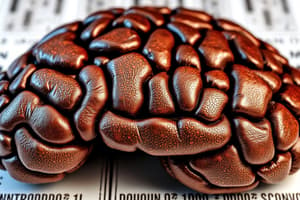Podcast
Questions and Answers
Which study is associated with the concept of reconstructive memory?
Which study is associated with the concept of reconstructive memory?
- Loftus and Palmer (1974) (correct)
- Setiawan et al (2013)
- Brown and Kulik (1977)
- Newcomer et al (1999)
What does the dual process model refer to in thinking and decision-making?
What does the dual process model refer to in thinking and decision-making?
- The division of thinking into emotional and cognitive processes
- A single model with multiple components
- A conflict between conscious and unconscious thought processes
- Two separate systems: intuitive (System 1) and analytical (System 2) (correct)
Which study is connected to the concept of flashbulb memory?
Which study is connected to the concept of flashbulb memory?
- Englich and Mussweiler (2001)
- Brown and Kulik (1977) (correct)
- Maguire et al (2000)
- Loftus and Palmer (1974)
Which neurotransmitter is associated with the agonist effect investigated by Setiawan et al (2013)?
Which neurotransmitter is associated with the agonist effect investigated by Setiawan et al (2013)?
Which technique was used by Milner (1966) to study brain and behavior?
Which technique was used by Milner (1966) to study brain and behavior?
What aspect of behavior is investigated by Wedekind (1995)?
What aspect of behavior is investigated by Wedekind (1995)?
Which study identifies the impact of working memory on cognitive processes?
Which study identifies the impact of working memory on cognitive processes?
Which hormone is studied for its role in memory enhancement by McGaugh and Cahill (1995)?
Which hormone is studied for its role in memory enhancement by McGaugh and Cahill (1995)?
Flashcards
Schema theory
Schema theory
Mental frameworks organizing information about the world, influencing how we perceive and remember.
Multi-store model
Multi-store model
A model of memory proposing separate stages (sensory, short-term, long-term) in processing information.
Working memory model
Working memory model
A model of memory emphasizing active processing of information in a short-term store (central executive, phonological loop, visuospatial sketchpad).
Reconstructive memory
Reconstructive memory
Signup and view all the flashcards
Neuroplasticity
Neuroplasticity
Signup and view all the flashcards
Localization
Localization
Signup and view all the flashcards
Neural Pruning
Neural Pruning
Signup and view all the flashcards
Hormones and memory
Hormones and memory
Signup and view all the flashcards
Study Notes
COGNITIVE APPROACH
- Schema theory: Brewer and Treyens (1981), Bartlett (1932)
- Multi-store model: Glanzer and Cunitz (1966)
- Working memory model: Landry and Bartling (2011), Baddeley and Hitch (1976)
- Reliability of cognitive processes (memory): Brewer and Treyens, Loftus and Palmer (1974), Bahrick et al. (1975), Landry and Bartling (2011)
- Reconstructive memory: Brewer and Treyens (1981), Loftus and Palmer (1974), Bartlett (1932)
- Emotion and memory (flashbulb memory): Brown and Kulik (1977), Neisser and Harsch (1992)
- Thinking and decision-making: Strack and Mussweiler (1997), Englich and Mussweiler (2001)
- Biases in thinking and decision-making (anchoring bias): Strack and Mussweiler (1997), Englich and Mussweiler (2001)
- Dual Process Model: System 1 Thinking (Englich and Mussweiler 2001), System 2 Thinking (Strack and Mussweiler 1997, Englich and Mussweiler 2001)
- HL Extensions: Memory in the digital world (Sparrow et al 2011, Mueller and Oppenheimer 2014), Technology and thinking (Sparrow et al 2011, Mueller and Oppenheimer 2014), Technology, emotion, and cognition (Sparrow et al 2011, Mueller and Oppenheimer 2014)
BIOLOGICAL APPROACH
- Techniques for studying the brain and behavior: HM (Milner 1966), Maguire et al (2000), Setiawan et al (2013)
- Localization: HM (Milner 1966), Maguire et al (2000)
- Neuroplasticity: Maguire et al (2000), Draganski (2004)
- Neural pruning: Draganski (2004)
- Neural networks: Draganski (2004)
- Neurotransmission: Agonist (dopamine - Setiawan et al 2013), Antagonist (propranolol for epinephrine/adrenaline - McGaugh and Cahill 1995, scopolamine for acetylcholine - Antonova et al 2011), Inhibitory (Prevot et al 2019), Excitatory (acetylcholine - Antonova et al 2011)
- Hormones and pheromones and behavior: Hormones (adrenaline - McGaugh and Cahill 1995, cortisol - Newcomer et al 1999), Pheromones and mating behaviour (Wedekind 1995)
- Genetics and behavior: Kendler et al (2006), Weissman et al (2005)
- Genetic Similarities: Kendler et al (2006), Weissman et al (2005)
- Kinship studies: Kendler et al (2006), Weissman et al (2005)
SOCIOCULTURAL APPROACH
- The individual and the group: Abrams et al (1990), Bandura (1961)
- Social identity theory: Abrams et al (1990)
- Social cognitive theory: Bandura (1961)
- Stereotyping: Abrams et al (1990)
- Cultural Dimensions: Enculturation (Kulkofsky et al 2011), Acculturation (Kulkofsky et al 2011)
HEALTH PSYCHOLOGY
- Health Promotion: Social Cognitive Theory (Lowe et al 2004, Sanderson and Yopyk 2007), Health Belief Model (Quist-Paulsen et al 2003, McAffee et al 2013)
EPIGENETICS
- Epigenetics and depression: Kendler et al (2006)
- Evolutionary psychology: Wedekind (1995)
HUMAN RELATIONSHIPS
Studying That Suits You
Use AI to generate personalized quizzes and flashcards to suit your learning preferences.




